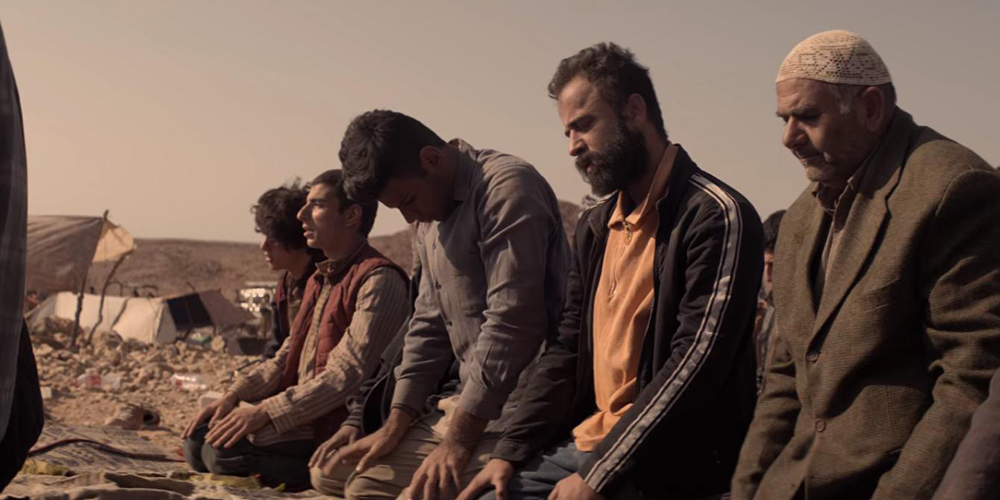As a reminder, my recaps are a little stream of consciousness, as I’m writing while I watch. Sometimes I might posit a theory that’s confirmed or disproven a few sentences later. Sometimes I’m guessing at what’s going on. I also take a “you’re sitting next to me on my couch while I watch” approach. That means you also get all my snarky comments as I watch. It’s part and parcel of watching TV with me.
We begin with a brief documentary style snippet where randos are interviewed on why they have sought out Al-Masih. Mostly it looks like people just need to see for themselves if this is the real deal. In Townless, or at least, an adjacent town to Townless, Eva is being hounded by her boss (Eva isn’t picking up the phone). The town looks filled to capacity, like they’re all headed to a festival in the middle of the desert. Given what they’re all there for, I’m calling it Yearning Man. At Yearning Man, we see bulldozers clearing away the town’s debris, but in its shadow is a massive sea of tents as people flock to be near Al-Masih. Staci, one of the people from the documentary, pulls into Yearning Man and we see in the back seat what appears to be a young woman with cancer. Possibly her daughter? Younger sister? Either way, Yearning Man isn’t the best place for someone with a compromised immune system. Eva is on site surveilling Al-Masih’s tent while CNN reporters circle the camp like vultures. Staci approaches Felix with her daughter, and Felix assures her that once she gets her name on the list, she will be able to see Al-Masih. This is starting to feel a bit like a Barnum and Bailey production.
Across the world, we move from one camp of self-imposed refugees to another, as we return to Jibril’s camp. Jibril, rescued in the waning moments of the previous episode by his friend, Samer, is back at the camp. Samer reads an ailing Jibril what is either poetry or a botany book. There’s a less than subtle play being done here, as Samer reads about seeds that hide deep within the earth until they gain the desire to awaken. We see what you’re doing here, show. When he closes the book, it actually kind of looks like a copy of the children’s book Le Petit Prince, but it’s hard to tell.
Al-Masih and Felix have an uncomfortable conversation where Felix tries to get Al-Masih to share all his secrets with his growing band of followers, but Al-Masih makes it clear he doesn’t really have a plan. He’s just waiting for further instructions, reacting to events as they happen. It’s kind of an interesting moment because it shows just how desperate Felix and the others are for two things: 1. Immediate relief from current suffering. 2. The peace of mind from knowing exactly what’s going to come next. But Al-Masih’s peace of mind presents itself as coming from faith, faith that they’ll be led in the right direction, so he doesn’t need to know in advance what that is. It’s an interesting juxtaposition of what faith vs. reassurance really means.
Eva has a brief conversation with Rebecca where the younger woman reveals she often has visions during her epileptic episodes. Eva seems more human here than in most scenes, which makes me wonder if her subdued personality is mostly related to her job or if she has a soft spot for children. Later that night, FBI Agent Man visits Eva at her hotel to tell her some of Al-Masih’s comments from their interview are direct quotes from a man who hacked the stock exchange and wrote a book called Cultural Terrorist that has since been used as a handbook for many fledgling terrorists. Looks like after a very miracle-y episode, the show feels the need to sow some disbelief among the viewers.
At the Palestinian refugee camp, maybe one of the most unintentionally funny scenes ever takes place where the morning call to prayer involves a man singing “Allahu akbar” doing vocal runs that would make Mariah Carey jealous while covering one ear like a diva. No worries dude; you’re on key and you’re killing it. Jibril can barely stay awake through the salat, and a man actually collapses, dead, in the middle of prayers. The refugee camp is starting to make Yearning Man look like a corporate retreat at this point. Across the border, Avi has gone missing and his ex-wife and boss are starting to worry about where he is. Well, look no further than Texas! Looks like Avi slipped into America, which makes me wonder why we even bother with border controls since getting in seems pretty easy. He’s already got himself a fake ID and like any real fake Texan is already buying a gun! But wait, aren’t there background checks and other things that make that difficult? Nope. The old-timer at the counter asks a couple questions, but once the roll of cash comes out, it seems clear there’s nothing illegal going on here, so time to make a sale. Seems like a small but pointed political moment, but, if that’s even 5% true, it’s probably a point worth making. Nearby at Yearning Man, Anna’s father, Beau Bridges playing a rich televangelist figure named Ed, arrives with a “save my little girl and save the day while destroying my son-in-law’s-self-respect” attitude.
After another documentary interlude with CNN, we’re back at Yearning Man, where Avi has shown up, probably not with a dish to pass at the local potluck. I neglected to mention earlier that a man and his son have been looking for their lost dog since the tornado hit. I probably should have realized it was too pointed a thing not to have a larger significance. Well their flyers are back, and we hear the gentle, soft whimpers of a dog trapped in some rubble.
Looks like the last 10 minutes are going to be a series of quick cuts. There’s a lot going on! In dueling sermons, Felix speaks to the people of Yearning Man as his flock, while the mullah leading the refugees in the Golan Heights calls Al-Masih a false prophet, exhorting them to travel with him to Jordan where safety awaits. While this is going on, the man and his son are still searching for their dog, and it appears Al-Masih hears the dogs whimpers too, from afar. Felix is telling a story of an approaching storm as Avi walks across the plain with his gun cocked and loaded. He walks right up to Al-Masih’s tent just as the man emerges and points the gun right at him. Meanwhile, the father attempts to free Samson, their dog, from a pile of debris, but fails. Avi and Al-Masih stare down, face to face, all while Felix preaches about choosing and being chosen by God. Avi relents, and Al-Masih walks off as a confused Avi looks on. The father, who, in I suppose true Texas fashion, was walking down the street with a shotgun slung across his back, picks up the gun to put poor Samson out of his misery. And I’m breaking the narrative to tell you right now that if Samson dies, I’m ending this recap here and not watching any more of this sick puppy snuff show.
The entire town, Yearning Man, Felix, Rebecca, Anna, and Avi all follow Al-Masih to the house where Samson is about to be killed. (Can we get any more Biblically named characters in this town?). Al-Masih enters and takes the gun from the father, presumably to stop him from killing the dog he’s about to save…and promptly kills the dog, telling the boy he was never meant to save him. He walks off without another word. Everyone looks distraught, which of course, because that was bullshit.
Salem reads more from Le Petit Prince, a passage about no one being satisfied with where they are as Rebecca appears poised to throw herself from a bridge. Al-Masih appears and tells Rebecca he is there for her. Salem reads Jibril to sleep, and when he wakes, much of the camp, including Salem, are gone.
Let’s check in on my theories from the first episode:
- He really is the Messiah, the second coming, and God has a message that he’s not pleased, and folks have been misinterpreting his vision for mankind for a couple thousands years, so he sent this dude to correct the record.
What do I think of this theory? Hard to say at this point. He clearly knows a lot of pithy sayings that get people to think, and he’s put a new fire in Felix, but that’s also because Felix wants a new fire, and this is convenient. If he’s just there for Rebecca, really there for Rebecca, how did he even know she was having visions? Is he being sent by God to collect prophets? Also, what was the point of that scene with the dog? I guess you could say, if you want to support this theory, that it’s not always in God’s plan to save all creatures who ask for saving, but walking all the way out there just to shoot the dog and come back seemed pretty unnecessary from a narrative point of view, and ruined much of the episode for me.
- It’s a government conspiracy / It’s someone else’s conspiracy
What do I think of this theory? If someone knows that Rebecca is having visions, it makes sense. Clearly she has epileptic episodes, so she must have seen a doctor. Did she tell someone about the visions? Did that get put in a file somewhere, and some cult or government group is using Al-Masih to collect people who have visions? Or is he really the agent of chaos that Eva thinks he is? Hard to tell at this point.
General thoughts so far: They leaned very, very hard into the whole “both of these camps are the same” narrative here, especially at the end as scenes merged together with Felix narrating while the camera was in the Golan, and Salem narrating while the camera was in Texas. Clearly, we are starting to thin the herd into the characters that matter and the ones who don’t. But it’s hard to see how some of it fits together without at least some level of divine intervention. Perhaps one of the most interesting things the show has done, as I’ve noted before, isn’t so much the plot—which is intentionally manipulative of the audience as it vacillates back and forth between the “is he or isn’t he” nature of the story—but the commentary the show has about society at large. The show is making several related points about both religious and agnostic—Middle Eastern and Western—people today, about how we view the world, and about how we separate ourselves from the broader world. It’s also perhaps making a very subtle point about Trump. The Trump phenomenon is something the Left has a lot of trouble understanding, especially the way many on the Right treat him with such reverence. But The Messiah thus far has laid out a blueprint for why Trump managed to win when he did. He came along and made people feel heard and echoed the maxims and truisms they’d be longing to hear a powerful figure utter aloud. It wasn’t that they wanted Trump, per se, they needed him, desperately. Just as the people in this show needed Al-Masih. Anything wet looks like water to a person dying of thirst. What remains to be seen for Al-Masih, in this case, is whether that liquid is water or snake oil.
Episode grade: C (Lackluster development, slow pacing, too many pained, long looks in the camera in place of actual storytelling, and a totally gratuitous dog murder that ruined the end of the episode.)








